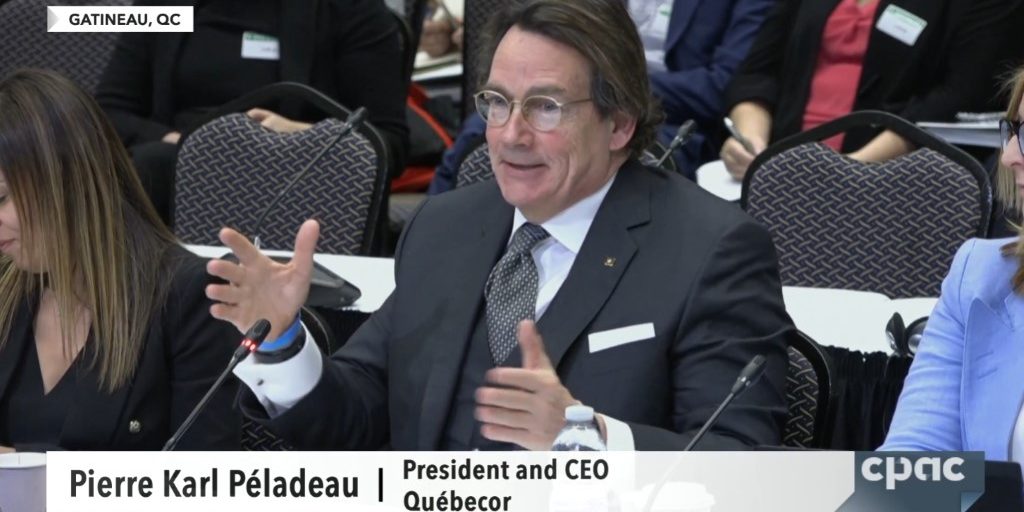Wholesale internet rates must be the same coast to coast: Peladeau
Telecom | 02/28/2025 11:56 am EST
While the CRTC’s recent decision to expand the wholesale fibre access framework across the country was a “step in the right direction” for Quebecor Inc. CEO Pierre Karl Péladeau, he still argues that the rates set by the regulator for those services are too high.
Péladeau made the remarks during Quebecor’s fourth-quarter earnings call Thursday, Feb. 27, repeating his complaints about the interim wholesale rates the CRTC set in October, which competitors pay to carriers in order to access their fibre networks.
Péladeau argues that the rates do not reflect retail prices of fibre-to-the-premises (FTTP) services offered by the Big Three incumbent telcos (BCE Inc., Rogers Communications Inc., and Telus Corp.) and give western companies such as Telus an unfair advantage due to the rates being even higher in western provinces than in Quebec and Ontario.
With rates being higher in that region, the CRTC is “enabling [Telus] to compete aggressively with the established players, while [Quebecor is] at a disadvantage in Western Canada…,” said Péladeau.
“This unacceptable situation prevents competitors marketing uniform retail offers in all parts of Canada and prevents Quebecor from creating healthy competition in Western Canada by offering a wider range of affordable choices,” the CEO continued.
“Quite simply, [third-party internet access] rates should be the same coast to coast, why should Western Canadians pay more for internet?”
Interim aggregated rates for FTTP access to Bell’s network in Ontario, Quebec, and Atlantic Canada have been set at $68.94 per month, per premises for three megabits per second (Mbps) to 1500 Mbps, and $78.03 for 1501 Mbps to 3000 Mbps.
For Telus, it is $65.25 for all speeds in Quebec. On a capacity-based billing basis, access rates to Bell’s network are $64.24 per 100 Mbps in Ontario, Quebec, and Atlantic Canada. In Telus’ case, it is $75.85 per 100 Mbps in Quebec.
However, in Alberta and British Columbia, Telus has an access rate for all speeds, 15 Mbps to 1.5 Gbps, of $80.41. Its capacity-based billing rate in those provinces is $75.86 per 100 Mbps.
Péladeau also highlighted Telus’ ongoing push against blocking the Big Three from using the wholesale access framework, stating that Quebecor is “particularly concerned by Telus’ tactics to try and convince the CRTC that they qualify as a new entrant in the eastern region of Canada.”
Telus is at odds with many players in the telecom industry when it comes to the wholesale access regime. The Vancouver-based company is of the view that allowing the incumbents to use the wholesale mandate, so long as it is outside of their traditional serving territories, is good for competition. Meanwhile, the majority of other stakeholders believe that it would disincentivize incumbents from investing in their own fibre networks and puts the long-term viability of competitors at risk.
Quebecor on Thursday reported increased profits for the fourth quarter of 2024 compared to the previous year, while its revenues only saw a very slight 0.4 per cent decline.
For the three months ended Dec. 31, the company reported consolidated revenues of approximately $1.5 billion, staying almost flat year-over-year.
Meanwhile, Quebecor’s profits were $177.4 million for the quarter, a 25.6 per cent increase from $141.2 million year-over-year.
The company’s sports and entertainment segment was the only one that saw increased revenues, coming in at $69.2 million, a 22.7 per cent increase from the previous year’s $56.4 million. The company credited the growth to increased revenues from concerts and books.
Telecommunications revenues were just under $1.26 billion, a 2.5 decrease from almost $1.3 billion reported in Q4 2023. Media revenues shrunk to $194.7 million, a 4.9 per cent decline from $204.8 million the previous year. Quebecor noted in its financial statements that ad revenues stemming from its acquisition of the out-of-home advertising business NEO-OOH slightly offset this decline.
Mobile telephony was the only service that saw growth in terms of subscriber numbers, with net additions coming in at 87,500 during the quarter. This was 32.4 per cent more than the 66,100 net additions during the same quarter in 2023. Quebecor attributed the increase to the expansion of its Freedom and Fizz footprints throughout the year, including regions in British Columbia, Alberta, Manitoba, and Ontario. Videotron and Fizz also expanded their footprint in the Témiscamingue, Charlevoix-Est, Gaspésie, and Côte-Nord regions of Quebec.
The company reported total mobile subscribers of 4,138,200 by the end of the year.
According to Quebecor, its portfolio of Videotron, Fizz, and Freedom is available to over 33 million Canadians, approximately 80 per cent of Canada’s population.
Net internet subscriptions declined by 1,700 in Q4 2024 compared to an increase of 6,300 in the same period of 2023. Quebecor’s total year-end internet subscribers added up to 1,732,600, an increase from 1,727,600 last year.
Net TV subscribers fell by 17,500 during the quarter, and the company’s total reduced to 1,294,400 from 1,355,600 last year.
Net wireline phone subscribers fell by 18,600 during Q4 2024. Quebecor reported 608,900 subscribers by the end of the year, a reduction from 674,700 in 2023.
Mobile average revenue per user (ARPU) came in at $34.36, a 5.3 per cent decrease from $36.29 in Q4 2023. The company blamed the decline on higher promotional discounts, lower overage revenues and a “change in the customer mix, including the dilutive effect of Freedom’s and Fizz’s prepaid services.”

